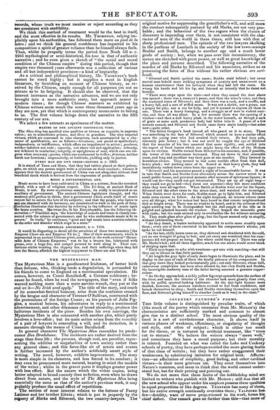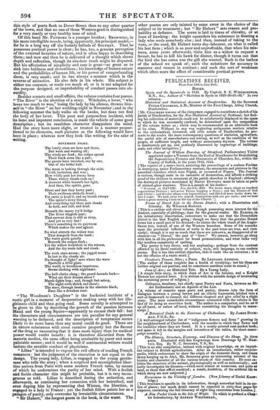COVENTRY PATMORE'S POEMS.
Tins little volume is distinguished by peculiar traits, of which (like much of the poetry which emanates from Mr. Moxotes) the characteristics are sufficiently marked and common to almost give rise to a distinct school. The most obvious quality of the band is a sort of unwholesome character. It shows itself in various phases of weakness, effeminacy, or singularity of thought and style, and often of subject ; which is either too small for the theme, or is tortured by artificial treatment, like "trees cut to statues." We believe the writers always "mean well," and sometimes they have a moral purpose; but their morality is tainted. Founded on what was called the Lake and Cockney schools of poetry, they have perhaps avoided the more glaring faults of that class of writers ; but they have rather exaggerated their weaknesses, by substituting imitation for original bent: • Affecta- tion—an affectation of simplicity, good feeling, and other cardinal virtues—is their most grievous sin. They erect themselves into Nature's mammas, and seem to think that the world cannot under- stand her, but for.their petting and pointing out.
We do not mean that these faults of the hobbledehoy mind are limited to writers who publish with Mr. MOXON ; still less that all the new school who appear under his auspices possess these quatities in equal proportions or like degrees. TENNYSON has many of thew, but his native strength continually, overrides them ; TaLrotnin has, few—debility, want of nerve proportioned to his work, forms hioc chief defect. Our remark goes no further than this—that more of
this style of poets flock to Dover Street than to any other quarter of the town, and that no one of those Western genii is distinguished for a very manly or very healthy tone of mind.
Of this band Mr. PATMORE is a younger brother; BROWNING, in his more intelligible moods, being, apparently, his principal model,— for he is a long way off the homely ballads of SOLTIIEY. That he possesses poetical power is clear ; he has, too, a genuine perception of the external beauties of nature, and is often happy in describing them; and now and then he is delivered of a thought which shows depth and reflection, though its absolute truth might be disputed. But his affectation of simplicity and ease is great—so great as to sink into baldness and slovenliness ; his knowledge of human nature and the probabilities of human life, or his power of comprehending them, is very small; and he has always a manner which is the reverse of attractive. He also fails in his whole. His subject is either too common, or made too much of', or it is not adapted for the purpose designed, or improbability of conduct passes into ab- surdity. Besides sonnets and small affairs, the volume contains four poems. "The River" is the abortion of a story. Witchaire, a lover, "who loves too much to woo," losing the lady by his silence, drowns him- self in "the River" on her wedding-night in November ; and in the following summer the lady walks on the banks, but does not find the body of her lover. This poor and purposeless incident, with its lame and impotent conclusion, is made the vehicle of some good description ; but its resultless character disappoints the mind. Had the story been more slight, or treated in a manner propor- tioned to its elements, such pictures as the following would have been in place ; whereas now they look like writing for the sake of writing.
NOVEMBER NIGHT.
The lonely stars arc here and there, But weak and wasting all; The winds are dead ; the cedars spread Their black arms like a pall; The guests have vanished, one by one, Out of the bridal hall.
The moon is looking through the mist,
Cold, lustreless, and wan' • How wildly past her dreary form
Those watery clouds rush on !
A moment white beneath her light, And then, like spirits, gone.
Silent and fast they hurry past ; Their swiftness striketh dread ; For earth is husli'd, and no breath sweeps The spider's dewy thread, And everything but those pale clouds Is dark, and still, and dead.
Beneath the mossy ivy'd bridge The River slippeth past ; That current deep is still as sleep, And yet so very fast ! There's something in its quietness Which makes the soul aghast.
No wind stirreth the willow tree That droopeth from the bank ; The water goeth quietly Beneath the sedges dank; Yet the willow trembleth in the stream, And the dry reeds talk and clank.
The weak stars swoon; the jagged moon Is lost in the cloudy air.
No thought of light save where the wave Sporteth a fitful glare.
The world, in breathless impotence, Seems choking with nightmare.
The hall-clocks clang ; the guard-hounds bark— What are their dreams about ?
Marsh-lights leap; and, though fast asleep, The night-owls shriek and shout ; The stars through breaks in the absolute black, Race le a drunken rout.
"The Woodman's Daughter" is the hacknied incident of a rustic girl in a moment of desperation making away with her ille- gitimate child and then going mad. Some novelty is attempted to be given to this by describing the growth of the passion between Maud and the young Squire—apparently to excuse their fall: but the characters and circumstances are too peculiar for any general warning to be deduced, and the description of temptation seems likely to do more harm than any moral could do good. There are in nature substances with some curative property but the flavour of the drug so nauseating that it does more injury than its medical power would confer benefit : it is therefore discarded from the materia medica, the same effect being attainable by purer and more palatable means ; and it would be well if sentimental writers would imitate the sensible conduct of physicians.
"Lilian" is intended to expose the evil effects of reading French romances : but the judgment of the execution is not equal to the design. The young lady, Lilian, is engaged to the young gentle- man who tells the story ; when a sceptical and accomplished liber. tine arrives from Paris with some modern French tales, by means of which he undermines the purity of her mind. With a foolish and feeble character this might be probable, but it is very incon- gruous as told. Lilian is described during the seduction, and afterwards, as continuing her connexion with her betrothed, and even duping him by representing that Winton the libertine, is engaged to a lady in France : yet the foolish fellow paints her as a paragon of purity, only overcome by irresistible circumstances.
"-Sir Hubert," the longest poem in the book, is the worst. The
other poems are only tainted by some error in the choice of the subject or its treatment ; but " Sir IIubert " sets reason and pro- bability at defiance. The scene is laid in times of chivalry, or at least of hawking : the knight squanders his substance in feasting a lady who weds somebody else; and then, instead of taking to the wars, or the road, Sir Hubert turns day-labourer, on what is called his last farm ; which is so poor and unprofitable, that when his mis- tress, some years afterwards, visits him as a widow to request a favour, he has to kill his hawk for dinner, though it turns out that the bird she has eaten was the gift she wanted. Such is the bathos of the school we speak of; such the substitute for accuracy in manners and reason in conduct ; and such the sort of weakness which often mars the effect of considerable poetical powers.



























 Previous page
Previous page